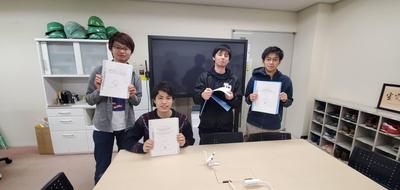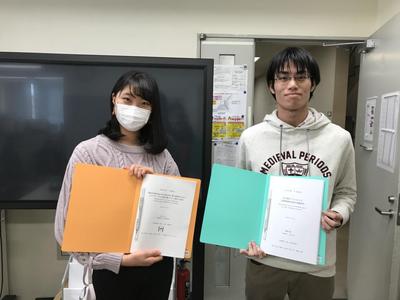Submission of the thesis!
[2020/1/31]
Fukuda Lab members have submitted their master’s theses and graduation theses, respectively.
M2 seniors completed submitting their master’s theses on 24th January.
Mr. Ogawa presented a paper titled “A Study on Short-term Tourism Traffic Congestion Prediction Methodology for Utilizing Various Real-time Data: A Case Study of Kamakura City”, in which he developed a model to output predictions of traffic volume and linked travel speeds in the central area of Kamakura City, and conducted a comprehensive study to verify whether the model can be used for short-term tourism traffic congestion prediction. A comprehensive study was conducted to verify whether the model can be operated as a short-term forecasting model for tourist traffic congestion.
Mr. Kawai conducted a research titled “A Study on the Intention of Metropolitan Area Railway Commuters to Use Satellite Telework and Changes in Lifestyle Behavior Patterns” based on an activity-based approach to analyze the possibility of changes in people’s lifestyle and transportation behavior patterns as a result of a policy to establish satellite offices in suburban areas of the metropolitan area. The analysis was based on the activity-based approach. Using this model, he also clarified in which locations in the Tokyo metropolitan area satellite offices could improve the quality of life of commuters.
In the presentation titled “The Influence of the Location of Electric Vehicle Charging Facilities on Route and Vehicle Type Selection,” Mr. Shiroma conducted mathematical modeling of the interdependence between the route selection behavior of electric vehicles and consumers’ vehicle type selection behavior on a road network with charging facilities, using equilibrium concepts from game theory.
In the evaluation of transportation-related investments such as high-speed rail, Mr. Muro noted that although direct benefits such as time-saving benefits have been the main focus of measurement and evaluation, in addition to time-saving benefits, economic effects and benefits in a broader sense have been proposed in recent years, and empirical research on this evaluation is accumulating. In a paper titled “The Impact of High-Speed Rail on Regional Specialization of Industries,” we empirically analyzed how the working population of each industry, which is one of the economic effects and benefits in the broad sense, changes as a result of the construction of high-speed rail.
On 31st January, two B4 students completed the submission of their theses.
Mr. Ukai conducted a laboratory experiment to investigate the applicability of a theoretical model of self-actualizing signals to a real network, and discussed the results of the experiment.
Ms. Tabuchi, in his paper titled “Research on Multimodal Transportation Behavior Model for Evaluating the Introduction of Mobility as a Service (MaaS),” constructed a behavioral model that simultaneously determines the means of transportation and travel space, with a view to evaluating the introduction of MaaS.
He will study abroad in Sydney for about a year. There will be more vacant desks in the lab, and it will be lonely, but he has been wanting to study abroad since he joined the lab last year, so I hope he will do his best and enjoy it! I would like to visit Australia while Mr. Koyada is studying in Sydney (because of the cost of accommodation…www).






